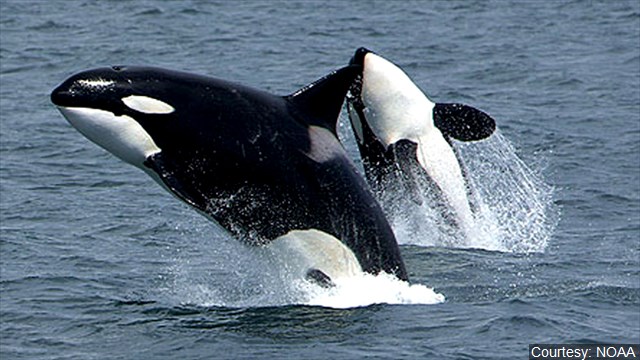Apparent New Orca Calf Spotted In Endangered Pod In Pacific Northwest

SEATTLE (AP) — A baby orca has apparently been born to an endangered killer whale population in the Pacific Northwest, scientists reported.
The Center for Whale Research announced the baby orca Friday on Facebook, saying the organization received photos showing what appears to be a new calf in L pod, part of the population known as the southern resident orcas, near Tofino, British Columbia.
The baby looks to be more than three weeks old and would be the first new calf in the pod since L125 was born in 2021.
Researchers with the center will need to conduct on-the-water encounters with the group to determine the calf’s mother, assess the baby’s health and assign it an alphanumeric designation.
“We hope to see this calf in our study area very soon!” the group said.
“We’re always kind of cautiously optimistic with these new babies, because the mortality rate in the first year is quite high,” Michael Weiss, research director for the Center for Whale Research, told The Seattle Times. “But we’re hopeful — it’s good to have another L pod kid.”
The southern residents are struggling to survive multiple threats including a lack of adequate Chinook salmon in their foraging range, pollution and underwater noise that makes it harder for them to hunt.
If confirmed, the new calf would bring the total number of southern residents to 74.
That’s one of the lowest population counts since 1974, when 71 orcas were counted following a live-capture fishery in the 1960s, according to the National Oceanic and Atmospheric Administration.
The population peaked at 98 in 1995, but declined to 80 whales in 2001.
The southern residents live in matriarchal families split into three pods, designated J, K and L. They typically stay along the western coastal islands of Canada and Washington in the Salish Sea, and along the Oregon coast.
As apex predators, they occupy an important role in the ecosystem at the top of the food chain.
The southern residents were listed as endangered under the Endangered Species Act in 2005, and a recovery plan was finished in 2008.
In 2015 they were one of NOAA’s “Species in the Spotlight,” an effort to raise awareness and save “the most highly at-risk marine species.”
The National Marine Fisheries Service in 2021 expanded the southern resident’s critical habitat from the Canadian border down to Point Sur, California, adding about 16,000 square miles (41,000 square kilometers) of foraging areas, river mouths and migratory pathways.
You Might Also Like



